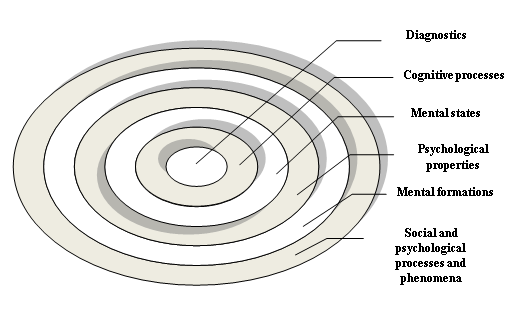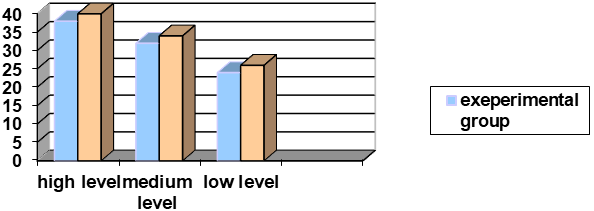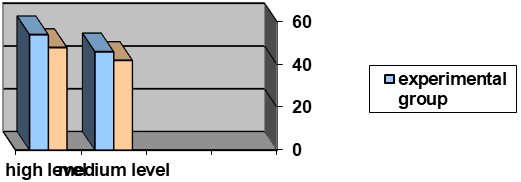Abstract
Relevance of the research: The relevance of the problem under study is determined by the need for the development of culture formation mechanism of future scientist’ intellectual work and the insufficient development of methodological and technological aspects of the development of intellectual work culture formation based on an integrated approach. Research methods: The leading research method is a diagnostic method that allows considering this problem as a process of formation of aspects characterizing the state of culture formation mechanism of future scientists intellectual work to predict possible deviations and prevent disruption of the functioning of the cultural and educational process as a whole. Diagnostic research as a peculiar method of self-regulation in the system provides feedback in the control loop. It allows one to purposefully and consciously master the culture of intellectual work, to take into account the studied features in the cultural and educational environment for the development of culture formation mechanism of future scientists’ intellectual work. The results: The article presents culture formation mechanism of future scientists’ intellectual work, consisting of interconnected psychological and pedagogical stages on the basis of comprehensiveness, ensuring the consistency of management actions of the educational process subjects. Practical significance: the considered culture formation mechanism of future scientists intellectual work contributes to the active socialization of students through the culture of intellectual work as a dynamic characteristic of development of the individual through the assimilation of social, legal and cultural norms, and the formation of the scientific worldview through self-development and self-realization in society.
Keywords: Culturemechanismdiagnostic methodintegrated approachpersonal competence
Introduction
The culture formation mechanism of future scientists’ intellectual work based on an integrated approach in the anthropology of education as a process takes place with the interrelation of the personality and the cultural and educational environment within the framework of the adopted legislation.
The development of culture formation mechanism of future scientists’ intellectual work is based on the diagnosis of psychological processes, psychological properties, mental states, mental formations, social and psychological processes and phenomena. The primary diagnostic study reflects the awareness of the effects of the surrounding reality, stable and constantly manifested qualities and personality traits, mental phenomena that are formed in the process of acquiring knowledge, skills, competencies, competencies resulting from interaction, communication and mutual influence (Figure

In the process of this study, it was confirmed that the development of culture formation mechanism of future scientists intellectual work based on comprehensiveness within the anthropology of education purposefully and systematically follows a certain scientific-methodical organized diagnostic, taking into account the specific individual conditions of interaction between an individual and society, practical results of activity ( Amhag, Hellström, & Stigmar, 2019; Gabdrakhmanova & Garifullina, 2017; Mezinov & Zakharova, 2019; Zeichner & Gore, 1992).
Problem Statement
The study of the problem was carried out in three stages:
at the first stage, an analysis of the methodological and technological foundations of the study was carried out, the work at this stage was aimed at compiling a bibliography, developing a conceptual apparatus, and defining the main research directions.
at the second stage, conceptual provisions were developed, a strategy for its implementation was justified, an ascertaining experiment was conducted.
at the third stage, a formative experiment was conducted on the implementation of the mechanism, an analysis of the pedagogical conditions, author programs, and the necessary adjustments were made to the research program.
Research Questions
How to improve culture formation mechanism of future scientists intellectual work as a process of successful personality development in the framework of an integrated approach and its development?
Purpose of the Study
The purpose of the article is to study the development of culture formation mechanism of future scientists intellectual work as a process of successful personality development in the framework of an integrated approach and its development.
Research Methods
In the process of research, theoretical methods were used: system-structural analysis of philosophical, psychological, educational, methodical literature; analysis and synthesis of scientific categories and phenomena; theoretical modeling of the structural and substantive foundations of the process under study; generalization of own and advanced pedagogical experience in line with the studied problem. Diagnostic methods - questioning, interview, testing, self-assessment, rating, generalization of independent characteristics.
Observational methods - observation, self-observation. Praximetric methods - analysis of activity products. An experiment in its ascertaining, formative, and control functions; content analysis and quantitative analysis of the results, monitoring.
In the process of research, mathematical and statistical methods were used - computer testing of students as part of the author's program, “Student's t-criterion”, methods of analyzing the activity system and the fullness of the components of intellectual work culture
Findings
Structure and content of the mechanism
The culture formation mechanism of future scientists’ intellectual work optimizes current process on a definite psychological pattern of learning new things on the basis of comprehensiveness. Comprehensiveness ensures the efficiency of the theoretical knowledge and skills transition into universal and practical competences, which are further transformed into personal competence ( Fokin, 2002; Mishra & Panda, 2007; Razumova, Sadykova, & Shakirova, 2018; Yarullin, Nasibullov, & Khuziakhmetov, 2018).
Personal competence is the ability to identify oneself with the images of the cultural and educational environment, the ability to internally process images, holistically and directly experience what is happening. This is the ability to switch one or another form of energy into a creative component, the ability to acquire techniques of psychological protection ( Vygotsky 2005; Hur, Maurer, & Hawley, 2019).
The components of the comprehensiveness of the culture formation mechanism of future scientists’ intellectual work are interrelated psychological and pedagogical stages, which we systematized in the table (table
The task of the teacher, working on the culture formation mechanism of intellectual work at the identification stage, should be adequate to the capabilities of students and reflect the specifics of the phenomenon under study. These include:
modeling of virtual and real cultural and educational scientific environment;
the creation of conditions for immersion students in it;
translation of the social situation in the problem-searching activity to solve the scientific problem posed. This provision is confirmed by our research, based on the culture formation mechanism of intellectual work and reflecting in practice the connection between intellectual activity, being and education.
The comprehensiveness of the culture formation mechanism of future scientists’ intellectual work is based on such intellectual property as awareness, allowing to establish a connection between objects and images at the level of verbalization, the removal of images from the internal representation to the outside through the word. This fundamental property in activity is necessary for operating with lexical units and establishing cause-effect relationships in reality ( Goncharov, 1947).
Verbalization as a thought process helps to correlate and update the conclusions based on reflection, analysis and understanding of their own actions.
An integral part of the comprehensiveness of the culture formation mechanism of future scientists intellectual work is self-knowledge. This is part of reflection, without which the process of verbalization does not work. Self-knowledge allows
to bring opinions and self-conceit in the right direction;
harmonize words and actions, reflect integrity, internal harmony, adequacy.
At this stage of the psychological mechanism, the teacher solves the tasks of organizing a scientific dialogue, encourages students to exchange positions on the basis of interpersonal contacts.
The psychological process of switching and converting energy to the goals of social activity and the realization of one’s own creative possibilities in activities is an integral part of the comprehensiveness of the culture formation mechanism of future scientists intellectual work. Such a sublimation for switching and transforming natural instincts for research activities, physical improvement, and computer culture will make it possible to solve problems with the least expenditure of energy.
An integrated approach to the culture of intellectual work allows you to independently test and evaluate your results in educational and scientific activities by selecting the most rational ways to solve emerging problems when an individual interacts with society.
The main task at this psychological and pedagogical stage is the organization of the creative activity of the subjects of the educational process. It is the fulfillment of creative tasks aimed at the development of personal qualities for the formation of the necessary competencies within the framework of the profession. Conducting research on the transformation of energy and forces into a creative stream has significant practical results.
An integral part of the psychological aspect of comprehensiveness is such a mechanism as the displacement of the image. This part depends on the educational process, technology and purpose. As a result of the study, it was established that the memory of the student is selective. The material they study is not forgotten, and from the short-term memory is transferred to the long-term memory, so there may be an idea that the educational information is forgotten.
The mechanism of image displacement from memory is necessary in order to constructively use the knowledge and skills base in practice in solving a problem task, to logically substantiate a behavioral strategy and rationally substantiate the concept of exit from a problem situation.
Stages of implementation of the mechanism
The implementation of the mechanism involved the following stages of experimental work to improve the effectiveness of the cultural and educational process as a whole:
determination of the forms of interaction of students with the cultural and educational environment on the basis of an integrated approach of the mechanism under consideration;
scientific and organizational interaction with teachers in the framework of scientific schools;
discussion issues at seminars, conferences, forums;
independent and collective research activities;
scientific and educational work on the studied issues;
providing individual assistance to less trained students.
The culture formation mechanism of future scientists intellectual work levels the state of crisis, since its main educational task is the ability to teach the search for rational solutions aimed at the creative component in the process of life activity in society. The result can be achieved through properly selected educational and informational material, special courses, trainings, solving logical problems that allow you to model a crisis in a communication situation.
Ascertaining stage
In total, the study covered 76 respondents. In the course of the primary diagnostics through the author's methodology “The manifestation of personal qualities from the standpoint of the intellectual work culture specifics”, it was established that, despite the fact that students are an adult category of students, typical learning difficulties are highlighted. We attributed to them:
insufficient development of individual personal qualities and certain abilities;
problems in the comprehensive formation of the components of the intellectual work culture, as well as gaps in knowledge, skills and abilities on individual components while mastering personal competences;
low level of cognitive abilities;
poor health, prompt fatigue, low working capacity;
low level of motivation to write scientific work and research activities;
increased anxiety and conflict;
ignorance of the law and their rights.
The majority of respondents in the experimental group have an initial high (39%), medium (32.9%) and low (28%) levels of personal qualities from the standpoint of the specific of intellectual work culture. Accordingly, in the control group, the indicators of primary diagnosis are somewhat higher. The performance indicators of students are reflected in the diagram (Figure

Formative stage
The stage of the formative experiment, taking into account the main indicators of psychological and personal development obtained in the ascertaining experiment, was aimed at diagnosing the main criteria for the erudition of the individual. Since IQ carries the main and semantic load in the process of forming intellectual work culture, it generates communicative thinking, which is based on communicative mechanisms involved in the studied pedagogical phenomenon. The status of communicative thinking as an independent process, reveals its structure, it affects the decision of verbal-thinking tasks, which are an indispensable condition for components fullness of the intellectual work culture.
Given the cognitive and transformative type of activity in which students are immersed, it should be noted that in a cognitive problem situation, speaking serves thinking. In the process of communication does not stop the cognition, transformation and evaluation. Since communicative thinking is associated with speaking through thought, thought is the basis for the subject of speaking. At this stage, activities were organized with the aim of forming a of communicative thinking mechanism (Table
The formation of these mechanisms affect the solution of communication speech-thinking tasks, the implementation of full-fledged activities, and therefore the formation of intellectual work culture. These mechanisms take place in the formation of intellectual work culture on various substantive content.
Control stage
At this stage of the experiment, as a result of the analysis, it was determined that a low percentage of formed personal qualities from the standpoint of the specifics of intellectual work culture are students who partially proficient in the integrated approach mechanism to the intellectual work culture, and those who master this mechanism showed better results.
In the course of the experimental work, diagnostic sections were carried out using the same method as at the ascertaining stage of the experiment.

The control check data showed changes in comparison with the measurements of the ascertaining experiment for all criteria, however, these changes were significant only in the experimental group, where there was a shift in the number of students with an average (51.3%) and high (92.4%) qualities. In the control group, there were no significant changes in the level of development of these qualities.
The intellectual work culture formation mechanism as a psychological-pedagogical integrative system is aimed at developing personal qualities during the individual's activity cycle. As an important component that affects the fullness of its components highlighted personal competence. The proposed methodology used for the diagnostic study of the level of the culture of intellectual work allows determining the rational learning trajectory and the level of organization of research work with students.
Conclusion
It has been established that the development of the intellectual work culture formation mechanism at a higher educational institution is the optimal system for the functioning of a cultural and educational environment based on an integrated approach to the processes occurring in the relationship of personality and cultural and educational environment.
It has been proven that culture formation mechanism of future scientists intellectual work in a higher education institution opens up the functional possibilities for transforming the traditional education system into an innovative, structured system using technologies and original techniques. Achievements of students are a form for the presentation of their own technologies, most fully reflecting the activities of these subjects of the educational process.
Acknowledgments
The research is performed according to the Russian Government Program of Competitive Growth of Kazan Federal University.
References
- Amhag, L., Hellström, L., & Stigmar, M. (2019). Teacher Educators' Use of Digital Tools and Needs for Digital Competence in Higher Education. Journal of Digital Learning in Teacher Education, 35(4), 203-220.
- Fokin, Yu. G. (2002). Teaching and education in higher education: Methodology, goals and content, creativity. Moscow: Publishing Center "Academy".
- Gabdrakhmanova, R. G., & Garifullina, L. R. (2017). Lichnost v kulture i obrazovanii: psikhologicheskoe soprovozhdenie, razvitiye, sotsializatsiya [Personality in culture and education: psychological support, development, socialization]. In A.V. Chernaya (Ed.), The 5th Russian Scientific and Practical Conference at Southern Federal University: Proceedings (pp. 447 – 451). Taganrog: SFU Publ.
- Goncharov, N. K. (1947). Fundamentals of pedagogy. Moscow: GUPI of RSFSR Ministry of Education.
- Hur, H., Maurer, J. A., & Hawley, J. (2019). The role of education, occupational match on job satisfaction in the behavioral and social science workforce. Human Resource Development Quarterly, 30(3), 407-435.
- Mezinov, V. N., & Zakharova, M. A. (2019). Teacher training for the development of social intelligence in schoolchildren. Education and Self Development, 14(2), 105-115.
- Mishra, S., & Panda, S. (2007). Development and factor analysis of an instrument to measure faculty attitude towards e-learning. Asian Journal of Distance Education, 5(1), 27-33.
- Razumova, O. V., Sadykova, E. R., & Shakirova, A. A. (2018). Tutorship in University Educational Activity. Modern journal of language teaching methods, 8(10), 427-431.
- Vygotsky, L. S. (2005). Psykhologiya razvitiya cheloveka [Psychology of human development]. Moscow: Eksmo Publ.
- Yarullin, I. F., Nasibullov, R. R., & Khuziakhmetov, A. N. (2018). The Problem Of Prospective Teachers' Active Citizenship Development. Modern journal of language teaching methods, 8(10), 334-340.
- Zeichner, K. M., & Gore, J. M. (1992). Teacher Socialization. Journal of Education for Teaching, 18(31), 239-245.
Copyright information

This work is licensed under a Creative Commons Attribution-NonCommercial-NoDerivatives 4.0 International License.
About this article
Publication Date
23 January 2020
Article Doi
eBook ISBN
978-1-80296-077-8
Publisher
European Publisher
Volume
78
Print ISBN (optional)
-
Edition Number
1st Edition
Pages
1-838
Subjects
Teacher, teacher training, teaching skills, teaching techniques
Cite this article as:
Nasibullova, G. R., Adilova*, V. K., Kosmodemyanskaya, S. S., & Yarullin, I. F. (2020). The Development Of Culture Formation Mechanism Of Future Scientists Intellectual Work. In R. Valeeva (Ed.), Teacher Education- IFTE 2019, vol 78. European Proceedings of Social and Behavioural Sciences (pp. 693-701). European Publisher. https://doi.org/10.15405/epsbs.2020.01.76
